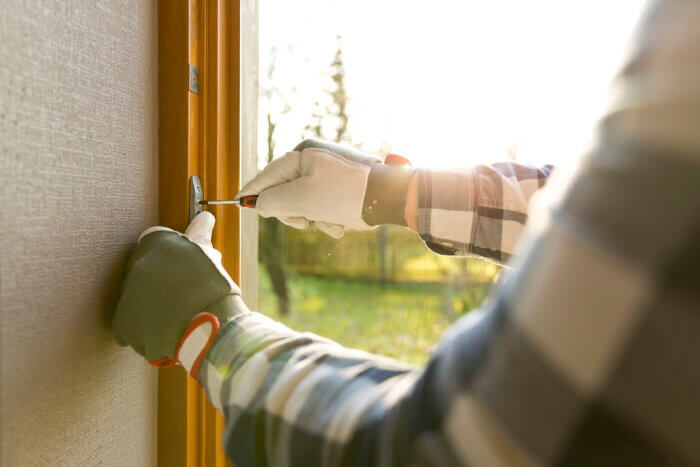Are you doing a windows project?
Modernize can pair you with three to four pros in your area, so you can compare options and save time and money.
Window upgrades are an excellent way to improve your home’s value and efficiency, but they can be expensive. One of the best options for homeowners looking to protect their investment on new windows is to take advantage of window warranties. In the event of a product malfunction or a mistake in the installation process, a warranty will keep you covered.
A home window installation warranty can come in all shapes and sizes and vary from manufacturer to manufacturer. This means that protections offered by one window brand might not be guaranteed under another—making understanding window warranties sometimes confusing.
The pros at Modernize are here to provide homeowners with some guidance on how to understand window warranties.
Types of Replacement Window Warranties
When it comes to selecting coverage, homeowners can choose from several types of window warranties—and not all of them are created equal. It is best to understand the different warranty types before choosing a window brand for your project.
While a replacement window warranty will vary between companies, it will often fall into a handful of larger categories – including limited lifetime, lifetime, prorated, or double.

Limited Lifetime Warranties
Limited lifetime warranties are the most common type of replacement window warranty. They are typically offered by the manufacturer to primarily cover performance and aesthetic defects. Though, what window parts they cover are limited, hence the name.
Additionally, homeowners should take note that “lifetime” refers to the amount of time the manufacturer determines the windows can maintain maximum quality. Lower-end windows might come with a limited lifetime warranty of only 3–5 years, while higher quality windows might be warrantied for decades.
Lifetime Warranties
Lifetime warranties, on the other hand, are more inclusive versions of limited lifetime warranties. These window warranties will cover all replacement parts. But much like the limited coverages, lifetime warranties are still valid for only as long as the manufacturer determines maximum quality can be maintained.
Prorated Warranties
In addition to lifetime and limited lifetime warranties, homeowners can also opt for a prorated warranty. This type of warranty covers a steadily decreasing percentage of replacement part costs. The older a window, the more a homeowner will be responsible to pay for out of pocket.
Double Lifetime Warranties
One of the most robust types of warranties is the double lifetime warranty. This protection offers window coverage for as long as the home is owned, and can even be passed on (also known as “transferred”) to the next homeowner in most cases.
Transferable Warranties
Warranties also may or may not be transferrable, meaning they remain valid after the sale of your home. A transferable warranty is especially important to maintaining the added home value of your window upgrade. If your warranty expires under a new owner, it could impact the purchase price of your home.
Manufacturer vs. Contractor Window Warranties
In addition to the types listed above, there are two window warranties that will typically come into play: the manufacturer warranty and the contractor warranty. Taking advantage of both types of warranties will help you best protect your new window investment, from installation to parts and labor.

Manufacturer Warranties
The manufacturer warranty guarantees your windows against defects in the windows themselves. To make sure this warranty is in full effect, you should work with a qualified contractor or installer, rather than install on your own.
Additionally, a qualified contractor may be able to answer any questions about your window manufacturer and their warranty policies. Contractors can also help you register your warranty and get in contact with the manufacturer in case of a malfunction.
Find the Right Contractor for Your Windows Project
Whether you’re ready to begin your project now or need some expert advice, our network of contractors are here to help. With a few simple questions, we’ll find the best local professionals for you
Contractor Warranties
This type of warranty comes from your window contractor. It guarantees their workmanship on the installation. These typically last for a year but may extend further.
More often than manufacturer warranties, window contractor warranties are often negotiable to better meet your unique needs. Even if problems of workmanship arise after the window contractor warranty has lapsed, a trusted contractor will usually provide certain support.
What Do Window Warranties Cover?
Much like the different types of window warranties, what they cover is also subject to differences among manufacturers. However, homeowners should expect certain basic coverages – regardless of who the warranty is purchased from. Use the list below to ensure the warranty included with your window installation is up to par.
- Materials. Replacement windows come in a variety of materials, from wood to vinyl to aluminum and more. Each of these materials are guaranteed to last a specific amount of time by the manufacturer. Should the windows show signs of wear and tear within this time period, they should be covered under warranty.
- Defects. Small defects, such as inconsistent color characteristics, should be protected by warranties.
- Hardware. Coverage of broken or malfunctioning window hardware should be covered.
- Energy-efficient Glass. Energy-efficient windows feature gasses such as argon or krypton between panes. While these gasses should last for many years, a warranty should protect homeowners should they deplete at a faster rate.
- Vision Obstruction. Dust or moisture trapped between window panes can be an unsightly annoyance, and can lead to a film developing on the windows. Warranties will typically cover this repair.
- Installation. DIY window repairs are a consideration for many homeowners. But while they might offer some immediate savings, they can present long-term issues. In the case of window replacement, window warranties usually cover errors made by licensed contractors. Not only are DIY replacements likely not covered, it might result in a voided warranty.
- Custom Options. Premium window options like custom glass designs are typically protected from defects by warranties.
- Glass Breakage. Accidental glass breakage might be covered under select warranty plans.
What are Window Warranty Exclusions?
Since warranties vary so greatly from manufacturer to manufacturer, it is important for homeowners to understand what their warranty doesn’t cover.
A window warranty is almost always a sound decision. But be aware that even the best protections can come with loopholes and exclusions that will not be covered by the warranty provider. These exclusions could encompass extreme weather, improper maintenance, DIY installation, windows made with tempered glass, and more.
Questions to Ask Window Brands and Contractors
Understanding the coverages and limitations of window warranties is important to ensure the best and most appropriate coverage possible. To better understand the terms, we encourage homeowners to review warranties with their window contractor. A trusted window contractor can answer questions, help explain the differences in warranties from manufacturer to manufacturer, and explain any language that you do not understand.
Homeowners will want to be prepared with several questions to ask manufacturers and/or contractors, including the following.
Length of warranty
Discovering a warranty is expired during a window replacement claims process can cause any homeowner a headache that results in extra and unexpected costs. Be sure to ask how long coverage is valid.
What is covered?
While hardware, installation, labor, breakage, and other issues mentioned above are often covered by warranties, it’s not a guarantee. Knowing exactly what protections a plan provides will help homeowners budget properly should a repair or replacement become necessary.
Service fees
Simply because a window is protected by a warranty does not necessarily mean that filing a warranty claim is free of charge. Some companies and manufacturers will charge homeowners a fee for service. While these fees are likely cheaper than replacing or repairing a window without warranty protection, it is still an added cost to take into consideration.
Transferability
For those considering selling their home in the near future, it can be beneficial to know if a warranty is transferrable to a new homeowner. Having active warranties that can be transferred can be an enticing selling point to potential buyers.
Contractor window warranties
These warranties come from contractors to guarantee their work and maintenance. Contractors may offer free of charge labor for a time period after installation and have their own terms and conditions on what and where the warranty is applicable.
As with many home renovations, finding the right contractor will be a big help in nailing down your desired warranties.
Find the Right Contractor for Your Windows Project
Whether you’re ready to begin your project now or need some expert advice, our network of contractors are here to help. With a few simple questions, we’ll find the best local professionals for you
Reviews from Real Homeowners
Welcome to Homeowner Resources! We are the Modernize blog. Modernize pairs more than 3 million homeowners a year with pre-vetted contractors in their area. This blog started because we believe homeowners should know everything about their homes, from how their HVAC works to which front door colors they might love. On Homeowner Resources, you can find information on every part of your home, right down to how you can negotiate with contractors to get the best price. Here's more about the blog.
Need a contractor? Learn more about how Modernize finds the right pro for you.






